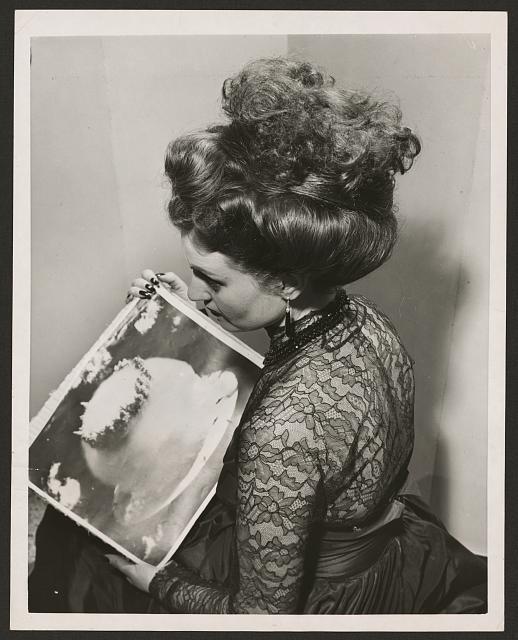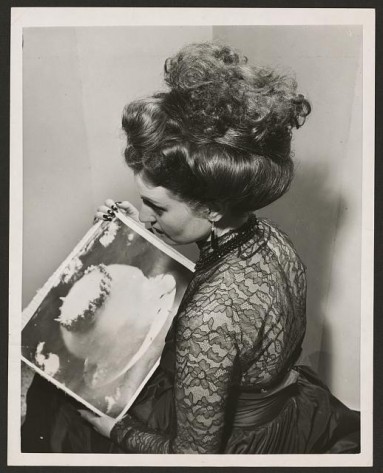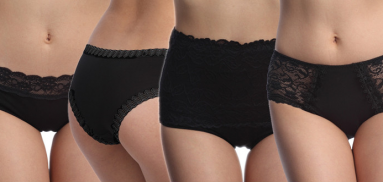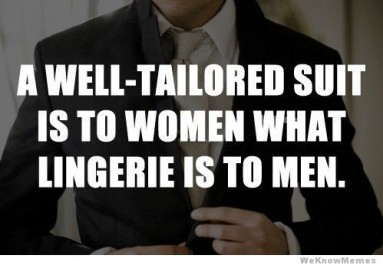What's going on in beauty this week, from head to toe and everything in between.
“Liliana Orsi, a 22-year-old beauty in Rome, Italy, displays her new atomic hairdo and the photo of the atomic blast which inspired it.”
From Head...
Da bomb: As Stuff Mom Never Told you puts it about this gem from Retronaut, the least politically correct hairdo ever.
...To Toe...
Flat-out cute: Sally to the rescue for those of us who need to take a break from heels: How to pair flats with dresses.
...And Everything In Between:
To boycott or not to boycott?: Thought exercise time: Let's pretend there's a company that makes sensible, affordable, well-made apparel produced entirely in America, but you have qualms about some of their practices—say, objectifying advertising, or perhaps the CEO is a total pig. What factors should you take into consideration when deciding to boycott? The Closet Feminist has some tips.
How many calories in whirled peas?: One way to bring Palestinian and Israeli women together in peace: diet talk. No, really. My knee-jerk reaction here to be utterly appalled, but in truth it's an extension of all beauty talk as a form of bonding with other women. (via Phoebe)
Gone fishin': For those of you waiting with bated breath to find out the results of the pedicure case wreaking havoc in the Arizona legal system, the wait is over: The state has ruled that the Arizona Board of Cosmetology was justified in banning spa owner Cindy Vong from continuing to offer the fish pedicure, in which tiny fish eat the dead skin from clients' feet. Vong may appeal the decision; no word as to reaction in the piscine community. Related: What deregulating the beauty industry—which has already happened in Indiana and is being considered in four other states—could mean for licensed practitioners.
One of (each) kind: "We already found one black girl. We don't need you anymore." Model Chanel Iman on racism in the modeling and fashion industries—hardly news, but every story here counts.
Old talk: A point of pride of mine is that I've never really engaged in "fat talk" with other women. It's boring, for starters, and I'd a million times over rather discuss why "fat talk" even exists than actually engage in it directly—and I've chosen my company accordingly. But "old talk"? Yes'm, sign me up, fine lines and stray grays and creaky hips and whoa I can't eat spicy food like I used to. But after reading the results of this study, which shows that "fat talk" may simply be replaced by "old talk" as women age, has made me vow to shut the hell up already.
Youth do: Um, but the above paragraph doesn't mean I won't try to look...not exactly younger, but fresher? Yes, fresher. And a recent study shows that heightening contrast between skin and features (i.e. darkening your lips and eyes) mimics the natural effect of youth...or "freshness."
H2No: Why you might want to rethink the healthfulness of water in your cosmetics (often the first ingredient—check!). (via Samvid Beauty)
Much cuter than most "period panties."
Thinx on it: Unless you've got one of those miracle clockwork uteruses (uteri?) so you can always plan ahead, chances are "Aunt Flo" has left some of your undies stained. So I'm excited to learn about Thinx—antimicrobial, moisture-wicking, stain- and leak-resistant underwear that actually looks cute. Developers Miki and Radha Agrawal and Antonia Dunbar recently won a product launch contest hosted by "Citizen Commerce" platform Daily Grommet (which will sell Thinx on their website), allowing the team to bring the product to market in May 2013.
For the record, I have no idea what Hemingway looked like when he was writing: I'm glad to see someone look at the role of beauty in the letters with the ambivalence the subject demands. (Jonathan Franzen, I'm looking at you.) But does anyone else sorta get the feeling the writer here just wanted to list which authors were good-looking? (Thanks to Erwin for the link!)
Shades of Butt Taco: Thoroughly intrigued by this background story on men's nail polish—a niche market, admittedly, but a slowly growing one.
Que sera, sera: What can you do when your daughter, still a child, looks at you and asks, "Daddy, am I pretty?"
Revved up: On occasion I'm naive enough to believe that men who objectify women are just going with the flow and simply haven't stopped to really examine what they're doing. Good thing the editor of U.K. Esquire is here to set me straight: "The women we feature in the magazine are ornamental. ... in the same way we provide pictures of cool cars." As an antidote, though, check out this video from Shelby Knox on the increasing youthfulness of sexualizing women. (Thanks to Baze of Beautycism for the link!)
"This Is What Happens When You Wear Semen-Scented Perfume": If that title doesn't hook you into this piece, nothing I could say would.
Beauty police: What is the "broken windows" theory if not cosmetics? Maryam Monalisa Gharavi looks at the ideological and etymological connection between cosmetics and the police regime. (Speaking of policing, want to be able to identify individuals in a crowd by their fashion sense alone? There's an app for that.)
"Perks, pitfalls, and profits": I enjoyed this personal examination of beauty privilege (and was honored that my own essay on the topic helped inspire the writer). "Whether you’re considered ugly, beautiful, or anything in-between, nobody has it easy in a culture where there is so much emphasis on appearances…especially if you are female. As a woman, you really can’t win in this arena. Yet, we’re taught it is the only game in town worth playing."
O RLY?
The vulnerability of lingerie: Lingerie Lesbian—a lover and defender of lingerie, obvs—neatly takes apart what's troublesome about this meme and the idea behind it. It's not that there's a problem with lingerie; it's that it's relegated to the private sphere. How, then, can it ever signal the same sort of power as a suit?
Beyond newsboy caps: Tomboy fashion! I'm pretty femmey myself but love the idea of "tomboy" clothes tailored to fit women's bodies. (via Sally)
Body/love: Two posts that articulate various troubles with "body love." Tori takes a political stance: "Regardless of whether I am beautiful, I expect that I should be able to find clothing appropriate to mybody and daily activities." Skepchick takes a...well, it's sort of political too, come to think of it: "The problem isn’t about women not loving our bodies. ... The problem is someone else telling me how to feel. The problem is being told that there is a standard of beauty, and I should ignore it. I should ignore it despite the fact that everyone is still holding me to it. I should ignore it and create my own. As long as it makes me feel pseudo-good, and makes other people feel okay with how I pretend to feel about me."
"Look, I Overcame!": Related to the above: If, like me, your eyebrow raises when looking at the "I love my body" therapeutic narrative, bookmark this piece from philosopher Robin James that looks at the ways women's adherence to such narratives has become a marker of "good girls" and "bad girls." "Overcoming must be visible because in the same way that individual feminine subjects use their resilience as proof of their own ideal feminine and ethical subjectivity, hegemony uses the resilience of its best women as proof of the ideally ethical and just character of its own social/political practices. ... 'Good girls' are resilient, whereas 'bad girls,' insufficiently feminine subjects, continue to be fragile and in need of rescue and/or protection."
And not a one of 'em is "quit shaving": Without having actually seen myself upon reading the title of this Refinery 29 piece, I'm pretty sure I had a cat-ate-the-canary grin: 10 Ways to Find Feminism in Your Beauty Routine.
Typing beauty: It's difficult sometimes to write about "beauty" because there's a dual-track thing going on with it: There's beauty and attraction as we experience it in a subjective way, and then there's beauty and attraction as presented by our cultural standards. The two mingle and overlap, but because of the nature of each of them, it's impossible to suss out what's subjective and what's...not objective, but rather what's shaped for us. Elisa sums it up succinctly in a way I just may print out on index cards and hand to people who insist in talking about beauty as though it's strictly one form or the other.



